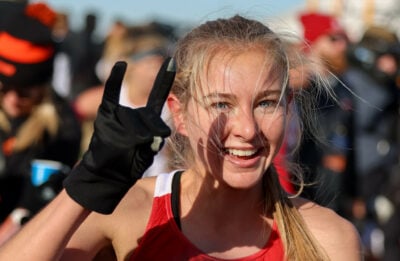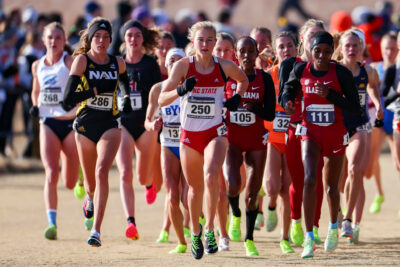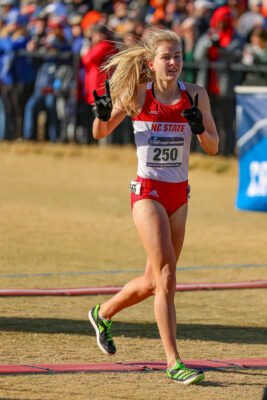Tuohy Goes Pro: Explaining Katelyn Tuohy’s Adidas NIL Contract
By Jonathan Gault
November 23, 2022
On Tuesday, just three days after winning the 2022 NCAA cross country individual title, North Carolina State distance star Katelyn Tuohy took to Instagram to announce she had signed an NIL sponsorship contract with adidas. With that one post, she ensured the collegiate running world would never be the same.
Tuohy’s announcement also represents a significant change in the structure of professional track & field in the United States. For years, NCAA rules stated that any student-athlete who signed an endorsement contract would forfeit their collegiate eligibility. But on July 1, 2021, that all changed. With states across the country relaxing restrictions around student-athlete compensation, the NCAA ruled that athletes could profit off their name, image, and likeness (NIL) while retaining collegiate eligibility.
While a number of high-profile collegiate athletes quickly cashed in — Alabama quarterback Bryce Young reportedly signed deals worth more than $800,000 within a month of the rule change — the new rules did not impact track & field much early on. A handful of athletes signed NIL deals, but none with shoe companies such as adidas, Nike, or New Balance that are the primary source of income for most athletes in professional track & field.
That changed in 2022. In July, to celebrate the 50th anniversary of Title IX, adidas announced it would sponsor 15 female student-athletes, a number that included one track & field athlete, University of Miami sprinter Moriah Oliveira. That deal was handled by the adidas team responsible for the brand’s sponsorships with NCAA schools. Tuohy’s deal, meanwhile, was handled through adidas’ sports marketing department for running, and as a result could have a much bigger impact on the sport.
A new era
In some ways, Tuohy’s adidas contract is similar to the contract signed by every professional track & field athlete coming out of college. Those traditional contracts offer compensation in exchange for an athlete competing in a brand’s gear at competitions and promoting the brand by making appearances and posting on social media. Tuohy, likewise, will be paid to promote adidas, though NIL contracts differ in a couple of key ways.
First, NIL contracts cannot offer “pay for play.” That means the contracts cannot offer bonuses based on hitting specific performance goals. True professional athletes typically receive bonuses for running national records or making World or Olympic teams. Those clauses are prohibited in NIL deals, so Tuohy cannot receive a bonus from adidas for winning an NCAA title.
Another difference is that most athletes are limited to wearing the apparel and footwear of their school’s sponsor in competition. For instance, Tuohy competes for NC State, whose athletic department has a sponsorship agreement with adidas. For schools like that, their school’s sponsorship agreement would supersede their NIL deal. So if Tuohy had signed with Nike instead of adidas, she would be able to make appearances for Nike and endorse the brand on social media but would still be required to wear adidas spikes and warmup gear at collegiate meets.
“If you sign an athlete from a Nike-sponsored school, the athlete would still need to wear [Nike] around team events, etc., head-to-toe,” says Spencer Nel, Senior Director of Sports Marketing, Running, at adidas. “But off-campus and on own private time would be able to wear whatever sponsor he/she had entered into an agreement with.”
Finally, it’s worth noting that Tuohy’s compensation is lower under her NIL deal than it would have been had she signed a full professional contract.
“You have a greater set of rights, so [a full professional contract] would definitely be at a higher level,” Nel says.
Tuohy’s deal was negotiated by agent Ray Flynn, who represents a number of top pros including Conner Mantz and Cole Hocker (the new NIL rules also allow athletes to hire agents to manage their NIL deals). LetsRun.com requested an interview with Flynn for this story. Here is what he wrote in response: “I am not able to speak to any contract specifics but only that I have exclusively and only a Name Image and Likeness arrangement with Katelyn through NC State University.”
What took so long?
So why did it take 16 months for the first major runner to sign an NIL deal with a shoe brand? One reason is that track athletes are not as in-demand as the top athletes in sports with more exposure such as basketball or football. But Nel also says that, during the first year of NIL, the shoe companies were still trying to figure out the impact of the new rules and what the new landscape might look like.
“Everybody had to get their heads around the do’s and don’ts, what was possible, what wasn’t possible,” Nel says.
Tuohy is a natural candidate for an NIL contract. She is one of the top athletes in the country, winning the NCAA outdoor 5,000-meter title in June in addition to her NCAA XC title on Saturday. And she is one of the most recognizable names in the sport in the United States — she has been in the national spotlight since winning her first NXN title at age 15 in 2017, and she has more Instagram followers (more than 91,000) than all but a handful of American pros.
“She’s a phenomenal athlete,” Nel says. “She has phenomenal potential. And obviously we’ve been monitoring her for some time and she’s just getting stronger and stronger.”
But Tuohy, as an NC State athlete, was already wearing adidas in competition. Why, then, would the brand sign her to an NIL deal when it was already paying NC State to ensure Tuohy raced in its gear?
For one, it builds goodwill. Tuohy’s NIL contract with adidas only lasts for as long as she competes for NC State. Once her eligibility expires — or once she decides to turn fully professional — she will have the opportunity to sign a new contract. Sponsoring Tuohy now ups adidas’ chances of signing her full-time once her college days are over. It also prevents her from jumping to another brand now.
Nel also says that there is more to a sponsorship contract than simply wearing a brand’s gear in competition. The NIL deal means Tuohy can now make appearances on adidas’ behalf and post about the brand to her significant social media following.
“It’s an opportunity to give back to the athletes,” Nel says. “There’s been this long discussion with NCAA athletes — specifically more in basketball and some of the other sports — where there was a feeling that athletes weren’t renumerated for the fact that they were these students doing these amazing things…The same applies for Katelyn. She’s doing amazing things and it’s an opportunity for her to earn some income. Because a like-for-like athlete in any other country in the world would be able to sign a pro contract and already earn money.”
What will the future look like?
It is not surprising that adidas was the first major shoe company to sign an NIL deal with a track athlete. One of the brand’s strategies in recent years has been to invest in athletes early, signing a number of top US athletes straight out of high school (or in some cases, while they’re still in high school). It is an approach that has paid dividends with runners like Noah Lyles and Erriyon Knighton.
And while Tuohy’s signing worked nicely because she already runs for an adidas school, Nel says that the brand would be open to pursuing athletes at schools that have agreements with other brands.
“Not being able to compete in adi spikes at NCAA champs because they’re a Nike school, that’s not insurmountable at all,” Nel says.
It seems likely that more collegiate runners will ink NIL deals with shoe brands in the coming months. NCAA men’s cross country champion Charles Hicks of Stanford has more than 30,000 subscribers on YouTube; NCAA men’s runner-up Nico Young of Northern Arizona has more than 50,000 followers on Instagram and has already used NIL to endorse other non-running brands. Both men figure to be in demand if NIL deals spread across the sport.
With the new NIL rules in place, the lines between collegiate and professional track are starting to blur, and long-term, NIL deals could incentivize athletes to stay in the NCAA system. There’s a reason why many collegiate athletes will spend their first year or two as professionals training with their college coach. In the NCAA, the school takes care of all travel and logistical issues. And from facilities to physiotherapists, athletes at many top NCAA programs have better training resources than professional athletes.
Katelyn Tuohy has been thriving at NC State and enjoying the collegiate experience. Now she will also get paid in addition to getting a free education. Makes a lot of sense.
Remaining in the NCAA system comes with certain restrictions, particularly when it comes to an athlete’s schedule — athletes running for an NCAA team will have to compete, for free, at conference and NCAA championships rather than receiving appearance fees to compete at professional meets. But the benefits of keeping the college structure intact while earning income through NIL deals could lead to more top athletes using all four years of their eligibility.
Even Nel says he’s not sure exactly what the sport will look like a few years from now. He expects more athletes will sign NIL deals with shoe brands. How many? That remains to be determined.
“We’re all learning and this is all new to us,” Nel says. “And so it’s that area that’s a little bit of an unknown.”
Video (We discussed Tuohy going pro on the LetsRun.com Track Talk podcast)
Discussion: *Jon Gault takes a look at Katelyn Tuohy going pro and has talked to Spencer Nel of adidas, the 1 question I have is…
*Katelyn Tuohy signs NIL deal with Adidas
Jonathan Gault, a high school All-American at 5,000m and cross country and track & field captain at Dartmouth, is one of the premier track & field writers of his generation. He has won numerous journalism awards including the NCAA Jim McKay Scholarship. He resides in Boston, Massachusetts, and is known for his daily analysis, in-depth profiles, historical pieces, and love of the Brighton & Hove Albion Football Club. You can follow him @jgault13 or email him.



